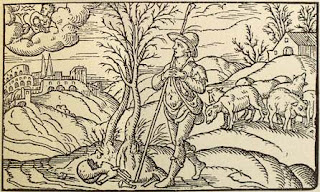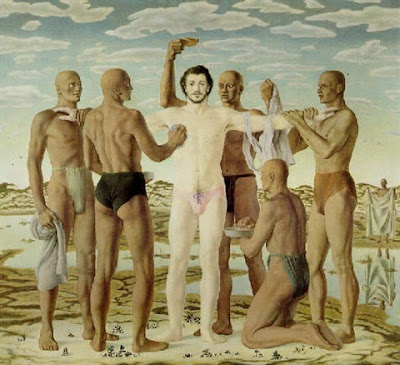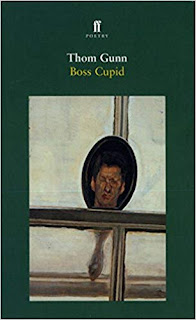Thom Gunn as Hermeticist in "The Differences"/Hermetical Poetry.
The Differences.
Reciting Adrienne Rich on Cole and Haight,
Your blond hair bouncing like a corner boy’s,
You walked with sturdy almost swaggering gait,
The short man’s, looking upward with such poise,
Such bold yet friendly curiosity
I was convinced that clear defiant blue
Would have abashed a storm-trooper. To me
Conscience and courage stood fleshed out in you.
So when you gnawed my armpits, I gnawed yours
And learned to associate you with that smell
As if your exuberance sprang from your pores.
I tried to lose my self in you as well.
To lose my self . . . I did the opposite,
I turned into the boy with iron teeth
Who planned to eat the whole world bit by bit,
My love not flesh but in the mind beneath.
Love takes its shape within that part of me
(A poet says) where memories reside.
And just as light marks out the boundary
Of some glass outline men can see inside,
So love is formed by a dark ray’s invasion
From Mars, its dwelling in the mind to make.
Is a created thing, and has sensation,
A soul, and strength of will.
It is opaque.
Opaque, yet once I slept with you all night
Dreaming about you — though not quite embraced
Always in contact felt however slight.
We lay at ease, an arm loose round a waist,
Or side by side and touching at the hips,
As if we were two trees, bough grazing bough,
The twigs being the toes or fingertips.
I have not crossed your mind for three weeks now,
But think back on that night in January,
When casually distinct we shared the most
And lay upon a bed of clarity
In luminous half-sleep where the will was lost.
We woke at times and as the night got colder
Exchanged a word, or pulled the clothes again
To cover up the other’s exposed shoulder,
Falling asleep to the small talk of the rain.
With gentle irony, Gunn opens his poem with two gay men walking, discussing their locality and Adrienne Rich. Her poetic appreciation of the common language and relationships between women becomes a clever re-statement of the courtly tradition: Gunn and his friend become troubadours in praise of their Lady in whom Amor shines. Gradually, the poem begins to map out the differences between two very different localities, poetic spaces: Cavalcanti’s obscure and brilliant Donna me prega and Gunn’s own canzone. The first word fixes the comparison. “Reciting” refers to an act of memory and that evokes Love which is an action whose “region is memory”: “In quella parte/dova sta memora/prende suo stato”. Gunn pays tribute to Cavalcanti’s poetic line (of 11 syllables, to break up the pentameter elsewhere) and starts to unravel his song so that a visceral poetry emerges. As Cavalcanti’s poem explores Love through the “Law of Physics”, so Gunn’s poem explores sex, friendship, male-to-male bonding through physical acts. The five stanzas of Gunn’s poem do not translate Cavalcanti’s five sections (though the central, pivotal stanza does) but rather pick up echoes from within poetic time. For Cavalcanti, Love’s light is identified by “a shadow from Mars”, a psychological statement of a traditional, astrological Venus-Mars, Love-War conjuction. For Gunn, this becomes a “defiant” gaze of love sufficient to calm a “storm-trooper” and an erotic drama to be played out as warfare, as a passionate and violent gnawing of armpits. In the final two stanzas of “The Differences”, Gunn (like a modern day follower of De Homero and De Amore) remembers that Venus and Mars gave birth to harmony. Through a concordia discors, the poet and his lover settle down to balanced restful order which is a “clarity/ In luminous half-sleep.” Looking beyond Cavalcanti, Gunn experiences a tenderness within the wildness of love and sex, a point of still communion within male kinship. His delicate image of lovers touching like trees echoes the myth of Philemon and Baucis whom Hermes transformed into trees so as they would become eternal within the world’s divine and natural order. Though here, the conjoined trees celebrates transience and the intensity of a moment come and gone. A sensitive, ironical contemplation runs throughout “The Differences”, one that gives Gunn a glimpse of a divine communion felt within flesh and bone. It is poetic hermet(r)icism. And all of it done, lightly, using simple “memorable speech”…” the small talk of the rain”.




Comments